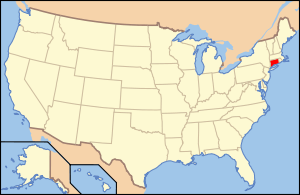LGBT rights in Connecticut
| LGBT rights in Connecticut | |
|---|---|
 | |
| Same-sex sexual activity legal? | Legal since 1971 |
| Gender identity/expression | Discrimination legislation and hate crime legislation |
| Discrimination protections | Yes (both sexual orientation and gender identity/expression) |
| Family rights | |
| Recognition of relationships | Same-sex marriage legal since 2008 |
| Adoption | Yes |
The establishment of LGBT rights in the U.S. state of Connecticut is a recent phenomenon, with most advances in LGBT rights taking place in the 21st century. In regard to very liberal LGBT rights, Connecticut was the second US state to enact two major pieces of pro-LGBT legislation; the repeal of the sodomy law in 1971 and the legalization of same-sex marriage in 2008.
Laws against homosexuality
Laws against consensual sodomy were repealed in 1971.[1]
Same-sex marriage in Connecticut
Connecticut enacted a civil union law effective October 1, 2005, that provided same-sex couples with some of the same rights and responsibilities under state law as married couples.[2]
On October 10, 2008, the Connecticut Supreme Court ruled in Kerrigan v. Commissioner of Public Health that same-sex couples have a constitutional right to marry and said the state's civil union statute violated the equal protection clause of the state constitution. The decision came in a case brought in 2004 by the eight same-sex couples who were denied marriage licenses in Madison, Connecticut.[3] The first same-sex marriages in Connecticut took place on November 12.[4]
In April 2009, the Connecticut General Assembly passed a bill to fully codify same-sex marriage within Connecticut statutes, abolished civil unions and all existing civil unions automatically became civil marriages from October 1, 2010. Signed into law by Republican Governor Jodi Rell.[5][6]
Discrimination protection
Connecticut bans discrimination on the basis of both sexual orientation and gender identity or expression in public places, public and private employment, governmental services and in receiving goods and services from public places or governmental institutions.[7][8][9]
Hate crimes
All individual citizens under state law are protected from hate crimes motivated by both sexual orientation and gender identity or expression.[10]
Adoption and parenting
Connecticut allows adoption by single individuals, opposite sex and same-sex couples, married or not. Statutes say that the sexual orientation of a prospective adoptive parent may be considered in adoption decisions, but there is no evidence that an adoption has been denied on the basis of sexual orientation.[11]
Gender identity birth certificates
The Connecticut General Assembly passed H.B. No. 7006 (Senate by a vote of 32-3 and the House by a vote of 126-18) a law to make it easier for people on the basis of gender identity, access and/or change to their birth certificates without any surgery. Governor Dannel P. Malloy signed the bill into law and becomes effective on October 1, 2015.[12][13][14]
References
- ↑ "Connecticut Sodomy Law". Hrc.org. 2007-03-08. Retrieved 2013-12-05.
- ↑ New York Times: William Yardley, "Connecticut Approves Civil Unions for Gays," April 21, 2005, accessed June 26, 2011
- ↑ New York Times: Robert D McFadden, "Gay Marriage Is Ruled Legal in Connecticut," October 10, 2008, accessed March 11, 2011
- ↑ New York Times: Lisa W. Foderaro, "Gay Marriages Begin in Connecticut," November 12, 2008, accessed March 11, 2011
- ↑
- ↑
- ↑ KIRK JOHNSON (1991-04-18). "Connecticut Senate Passes Law Protecting Gay Rights". Nytimes.com. Retrieved 2013-12-05.
- ↑ Human Rights Campaign: Connecticut Non-Discrimination Law, accessed July 6, 2011
- ↑ Wareham, Hannah Clay (July 6, 2011). "Conn. governor signs transgender protections into law". Bay Windows. Retrieved August 11, 2013.
- ↑ "Connecticut Hate Crimes Law". Hrc.org. Retrieved 2013-12-05.
- ↑ Human Rights Campaign: Connecticut Adoption Law, accessed June 26, 2011
- ↑
- ↑
- ↑